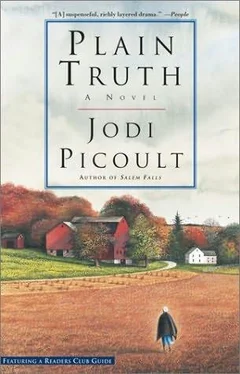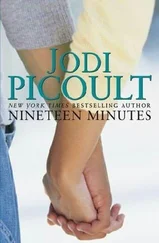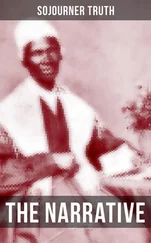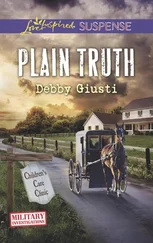“That’s not the point. It’s that I’d agree to yield to a set of circumstances chosen by the group, instead of trailblazing my own.”
“What do you do today, Jacob?”
“I’m getting my master’s degree in English at Penn State.”
“Your parents must be quite proud of you,” Ellie said.
Jacob smiled faintly. “I don’t know about that. You see, what commands praise in the English world is very different from what commands praise in the Plain world. In fact, you don’t want to command praise if you’re Plain. You want to blend in, to live a good Christian life without calling attention to yourself. So, no, Ms. Hathaway, I wouldn’t say my parents are proud of me. They’re confused by the choice I’ve made.”
“Do you still see them?”
Jacob glanced at his sister. “I saw my parents for the first time in six years just the other night. I went back to their farm even though my father had disowned me after I was excommunicated.”
Ellie raised her brows. “If you leave the Amish church, you can’t stay in touch with those who are Amish?”
“No, that’s the exception rather than the rule. Sure, having someone around who’s excommunicated can make things uncomfortable for everyone else, especially if you all live in the same house, because of the Meidung-shunning. One of those church rules I was talking about says that members of the church have to avoid those who’ve broken the rules. People who’ve sinned are put under the bann for a little while, and during that time, other Plain folks can’t eat with them, or conduct business, or have sexual relations.”
“So a husband would have to shun his wife? A mother would have to shun her child?”
“Technically, yes. But then again, when I was Plain, I knew of a husband who owned a car and was put under the bann. He still lived with his wife, who was a member of the church-and even though she was supposed to be shunning him, they somehow managed to have seven children who all got baptized Amish when it came time. So basically, the distancing is up to the individuals involved.”
“Then why did your father disown you?” Ellie asked.
“I’ve thought a lot about that, Ms. Hathaway. I’d have to say that he was doing it out of a sense of personal failure, as if it were his fault that I didn’t want to follow in his footsteps. And I think he was terrified that if Katie continued to be exposed to me on a regular basis, I’d somehow corrupt her by introducing her to the English world.”
“Tell us about your relationship with your sister.”
Jacob grinned. “Well, I don’t imagine it’s that much different than anyone else with a sibling. Sometimes she was my best buddy, and other times she was the world’s greatest pain in the neck. She was younger than me by several years, so it became my responsibility to watch over her and teach her how to do certain things around the farm.”
“Were you close?”
“Very. When you’re Amish, family is everything. You’re not only together at every meal-you’re working side-by-side to make a living.” He smiled at Katie. “You come to know someone awfully well when you get up with them at four-thirty every morning to shovel cow manure.”
“I’m sure you do,” Ellie agreed. “Were you two the only children?”
Jacob looked into his lap. “For a while, we had a little sister. Hannah drowned when she was seven.”
“That must have been hard for all of you.”
“Very,” Jacob agreed. “Katie and I were minding her at the time, so we always felt the blame fell on our shoulders. If anything, that brought us even closer.”
Ellie nodded in sympathy. “What happened after you were excommunicated?”
“It was like losing a sister all over again,” Jacob said. “One day Katie was there to talk to, and the next she was completely beyond my reach. Those first few weeks at school, I missed the farm and my parents and my horse and courting buggy, but most of all, I missed Katie. Whenever anything had happened to me in the past, she was the one I’d share it with. And suddenly I was in a new world full of strange sights and sounds and customs, and I couldn’t tell her about it.”
“What did you do?”
“Something very un-Amish: I fought back. I contacted my aunt, who’d left the church when she married a Mennonite. I knew she’d be able to get word to my mother and to Katie, without my father hearing about it. My mother couldn’t come to see me-it wouldn’t be right for her to go against her husband’s wishes-but she sent Katie as a goodwill ambassador, about once a month for several years.”
“Are you telling me that she sneaked out of the house, lied to her father, and traveled hundreds of miles to stay with you in a college dormitory?”
Jacob nodded. “Yes.”
“Come on now,” Ellie scoffed. “Going to college is forbidden by the church-but behavior like Katie’s is condoned?”
“At the time, she wasn’t baptized yet-so she wasn’t breaking any of the rules by eating with me, socializing with me, driving in my car. She was just staying connected to her brother. Yes, she hid her trips from my father-but my mother knew exactly where she was going, and supported it. I never saw it as Katie trying to lie and hurt our family; to me, she was doing the best she could to keep us together.”
“When she came to State College for these visits, did she become-” Ellie smiled at the jury. “Well, for lack of a better term-a party animal?”
“Far from it. First off, she felt like she stood out like a sore thumb. She wanted to hole up in my apartment and have me read to her from the books I was studying. I could tell she was uncomfortable dressed Plain around all the college students, so one of the first things I did was buy her some ordinary English clothing. Jeans, a couple of shirts. Things like that.”
“But didn’t you say that dressing a certain way is one of the rules of the church?”
“Yes. But, again, Katie hadn’t been baptized Amish yet, so she wasn’t breaking any rules. There’s a certain level of experimentation that Plain folks expect from their children before they settle down to take the baptismal vow. A taste of what’s out there. Teenagers who’ve been brought up Amish will dress in jeans, or hang out at a mall, go to a movie-maybe even drink a few beers.”
“Amish teens do this?”
Jacob nodded. “When you’re about fifteen or sixteen and you come into your running-around years, you join a gang of peers to socialize with. Believe me, many of those Plain kids take up stuff that’s a lot riskier than the few things Katie experienced with me at Penn State. We weren’t doing drugs, or getting drunk, or party hopping. I wasn’t doing that myself, so I certainly wouldn’t have been dragging my sister along. I worked very hard to get into college, and I made some wrenching deci sions in order to go. My primary reason for being at Penn State was not to fool around, but to learn. Mostly, that’s what Katie spent time doing with me.” He looked at his sister. “When she came to see me, I considered it a privilege. It was a piece of home, brought all the way to where I was. The last thing I would have wanted to do was scare her away.”
“You sound like you care very much for her.”
“I do,” Jacob said. “She’s my sister.”
“Tell us about Katie.”
“She’s sweet, kind, good. Considerate. Selfless. She does what needs to be done. There is no doubt in my mind that she’ll be a terrific wife, a wonderful mother.”
“Yet today she’s on trial for murdering an infant.”
Jacob shook his head. “It’s crazy, is all. If you knew her, if you knew how she’d been brought up, you’d realize that the very thought of Katie murdering another living being is ridiculous. She used to catch spiders crawling up the walls in the house, and set them outside instead of just killing them.” He sighed. “There’s no way for me to make you understand what it means to be Plain, because most people can’t see past the buggies and the funny clothes to the beliefs that really identify the Amish. But a murder charge-well, it’s an English thing. In the Amish community there’s no murder or violence, because the Amish know from the time they’re babies that you turn the other cheek, like Christ did, rather than take vengeance into your own hands.”
Читать дальше












